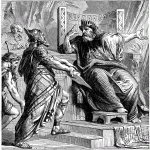There has been a flurry of discussion online about the story of the Syrophoenician woman. One great thing about lectionaries is that they not only lead to different churches focusing on the same texts, but different bloggers and other online authors as well.
Ian Paul’s approach poses the question in what I think is ultimately an unhelpful way, asking “Did the Syrophoenician woman in Mark 7 teach Jesus not to be racist?”
Many people have struggled with and resisted (whether consciously or instinctively) against calls to acknowledge their own racism. We tend to think of racism as a binary (ironically much the way that racists and many others think about race). For Ian Paul, if Jesus was racist in the manner some understand the story of his encounter with the Syrophoenician woman, then he is no different from a leader of the Ku Klux Klan. I doubt that Ian actually thinks in those terms, at least when Jesus is not involved, and so this is presumably an attempt to generate a response among those who are duped by the false dichotomy. But I suspect that if we were to try an experiment with other terminology, we would get a more nuanced response. If I ask Ian whether he is a racist he might say no, but if I ask him if he is sure that he is entirely free of prejudices and biases, I suspect that he will also say no.
That, I think, it the way we should frame the question about Jesus: Was he entirely free from human biases in his upbringing and culture? As a genuine human being, I think there is no way he could have had a human upbringing in which he learned language, culture, customs, and values, and yet be entirely free of all prejudiced and biases.
I think that if we are honest we will admit that if someone considers his own people children and others dogs, even if the contrast in mind is human children vs. beloved cute household pets, it is still an insulting contrast that Jesus makes. If we believe in the fundamental equality of human beings with respect to their rights and their deserving to be treated with dignity, then Jesus falls short on this occasion.
In other encounters we hear him speak in more egalitarian terms. Foreigners may join the patriarchs at the same table at the Messianic banquet. Not considered dogs who might get crumbs, they are now fellow guests who are welcomed and seated at the meal. Jesus’ meal practices sooner or later came to reflect this same spirit, and in turn influenced the practice of Christians such as we see Paul discuss and emphasize in 1 Corinthians 11.
Then we can ask the question of how Jesus learned, what might have influenced him to grow and be stretched so that he went from speaking about non-Jews as scrap-seeking dogs to welcomed guests at the table. We can ask the question in these terms: “Did his encounter with the Syrophoenician woman influence Jesus and motivate him to become more open towards non-Jews as part of his mission?” I think that, historically speaking, the logical answer to give is “yes.” If we are unwilling to, the reason is probably not historical evidence, but doctrinal commitments and/or a desire to “defend” Jesus’ reputation. Whether that is necessary, and whether we end up honoring him or misrepresenting him, is a question that is all too rarely asked.
See also the post on this story by John Squires who kindly recommended my book What Jesus Learned from Women for its treatment of the story:
On Jesus and Justa, Tyre and Decapolis (Mark 7; Pentecost 16B)
See also Vance Morgan’s blog post about the story:
In relation to my book What Jesus Learned from Women, there is now a wonderful review published in Christian Century authored by Rev. Sally Dyck. She begins by confessing some hasty judgments she made before reading it, wondering what insights a male scholar such as myself could possibly offer that would be of interest to her and others. As she goes on to write,
As if he could read my (unkind) thoughts, McGrath meets each of these prejudgments head-on in the book’s introduction. He makes the case that male scholars should be exploring women in the scriptures because women’s studies have been marginalized instead of normalized. In most pulpits and study groups in church basements and living rooms, the male perspective that has come down through history gets repeated. Men and women need to do the scholarship, McGrath contends. He notes that he has surrounded himself with women scholars and conversation partners to sharpen his own thinking.
Here’s her conclusion: “To counter the suggestion that because Jesus was divine he didn’t need to learn anything from anybody, McGrath repeatedly emphasizes that unless Jesus was able to learn, he wasn’t truly human. In addition to naming what Jesus may have learned from each of these women, McGrath makes the case that we have something to learn from them too. By offering us new perspectives and creative connections, he helps us create new lenses for viewing the Gospel women.”
Also of related interest:
Michael Roberts also noted Ian Paul’s blog post:
Marg Mowczko blogged about another part of 1 Corinthians 11, and what it says about women and hair, a passage that remains difficult and puzzling at the level of its meaning and not only in connection with its application:
Roger Wolsey discusses Paul and how progressive Christians view him:
An interesting primary text on Tumblr (Mostly Dead Languages) that has to do with ancient women:
And finally:
Bob Cornwall reviews The Jesus I Didn’t Know I Didn’t Know













